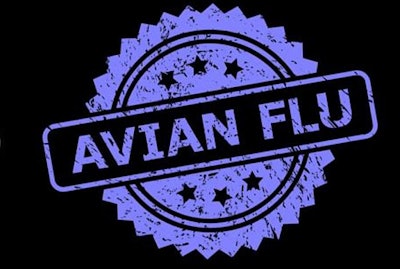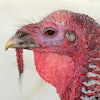
Although highly pathogenic avian influenza (HPAI) detections in birds continue to be widespread across Europe, their overall number is much lower than in recent years.
This is among the main conclusions of the latest review of the disease situation published by the European Food Safety Authority (EFSA). It covers HPAI viruses of the H5 “family,” and to the period December 2, 2023 to March 15, 2024.
EFSA attributes the decline — at least, in part — to the development of flock immunity in previously infected populations. This would help to reduce the risk of further transmission by limiting the shedding of viruses in the environment. Furthermore, according to EFSA, currently circulating influenza A(H5N1) viruses have a different genotype.
Over the review period, EFSA registered 227 outbreaks linked to HPAI viruses of the H5 group in domestic birds, and 414 in wild populations in 26 countries in the region.
In its latest assessment, the agency has not changed the risk of HPAI infection in humans. For the general population, EFSA regards the H5 virus currently circulating presents a low risk to health. For people in close contact with potentially infected birds, it assessed the risk as low to moderate.
2 European states register new cases on poultry farms
Based on information provided to the World Organisation for Animal Health (WOAH), the only European nation officially reporting new cases of HPAI in commercial poultry over the past two weeks has been Bulgaria.
Affected was a flock of more than 86,000 poultry in the southern province of Plovdiv, according to the report. Presence of the H5N1 HPAI virus serotype was confirmed after around 680 of the birds died at the end of March.
This was the ninth farm outbreak of HPAI in the country since early January, and the sixth in this province. It also involved the most birds, bringing the total number of Bulgarian poultry directly impacted by these outbreaks to more than 219,400.
The other country registering new cases of HPAI since mid-March is Sweden. This nation’s total outbreaks in poultry increased by one to three, according to the latest edition of the Animal Disease Information System (as of March 22). The System monitors the animal disease situation in European Union (EU) member states and adjacent countries, and it is compiled by the European Commission (EC).
By that date, the outbreak total affecting the region’s commercial flocks stood at 133 so far in 2024, with one or more outbreaks confirmed in 15 countries.
Highest total so far this year is from Moldova with 55, followed by Poland (24), and Germany (nine). Only Bulgaria and Sweden have registered new cases in this population with the EC since March 8.
One further outbreak in backyard poultry
The EC System also records HPAI outbreaks in non-commercial poultry, zoos, and similar premises, but in a separate category, “captive birds.”
As of March 22, the outbreak total for this category stood at 46.
Now with a total of 23, the Czech Republic (Czechia) has registered the most outbreaks of this type since the start of 2024. It is also the country adding the only additional outbreak since the previous edition of the System.
According to a recent notification to WOAH from the national animal health agency, the latest HPAI cases were in a mixed hobby flock of 14 birds in Southern Bohemia in the south of the country.
For comparison, the EC recorded a total of 521 HPAI outbreaks in 24 countries in commercial poultry in 2023, and a total of 99 outbreaks in captive birds in 15 European states.
France makes progress on HPAI vaccination
As of March 28, just over 25 million farmed ducks in France have received a first dose of HPAI vaccine, reports the agriculture ministry.
Following devastating losses of poultry due to HPAI in recent years, the ministry began a vaccination campaign in October of last year. Administration is mandatory for ducks reared on commercial farms on the mainland of France, and to those whose products are destined for sale on the domestic market.
While the program covers all regions of the country, 70% of the vaccinated birds so far are located in the western regions Pays de la Loire and Nouvelle-Aquitaine.
Great Britain introduces compulsory registration
Earlier this month, the government announced the introduction of a new register for bird owners.
In future, all poultry in England, Scotland, and Wales will need to be registered, according to the agriculture department, Defra. Previously, registration was only required for poultry kept in flocks of more than 50 birds.
The change will help to protect the health of poultry and captive birds from diseases such as HPAI and Newcastle disease, as well as public health. Defra reports that it is a consequence of a review published in 2018 and lessons learned from previous HPAI outbreaks in the United Kingdom (U.K.), adding that it will aid the passing of relevant information on cases of notifiable avian diseases to all flock owners.
All those affected are urged to prepare for registration of their birds. Exempt from registration will be owners of caged captive birds kept entirely in homes.
For owners in England and Wales, birds must be registered by the deadline of October 1. For Scotland, the new register will open on September 1.
Introduction of the new registration process has been welcomed by the national poultry industry body.
“New registration requirements are a good step towards supporting bird-keepers and Government to collaborate seamlessly to combat disease spread,” said Richard Griffiths, chief executive of the British Poultry Council. “Timely communication ensures all bird-keepers receive important updates and stay informed, amplifying efforts to work together to track and control the spread of avian influenza. Alongside stringent biosecurity measures, registration is another tool in the toolbox to safeguard bird health.”
Widespread outbreaks in European wild birds
As of March 22, a total of 359 HPAI outbreaks among wild birds had been registered with the EC System by 25 countries in Europe.
Compared with the previous update dated March 8, this is an increase of 34 outbreaks. This includes an additional 17 in Germany, nine in Denmark, three in Romania, two in Croatia, and one in each of the Czech Republic, Hungary, and Poland.
For the year to that date, a total of 121 outbreaks in wild birds had been confirmed in Germany, 71 in Denmark, and 22 in Romania.
All three of these countries had registered new cases since the March 8 update of the EC’s System — as had Croatia, the Czech Republic, Hungary, and Poland.
Furthermore, the veterinary agencies of Belgium and France each confirmed to WOAH one additional wild bird testing positive for the H5N1 HPAI virus variant.
In the U.K., the H5N5 serotype has been detected in three more wild birds, based on notifications to the same agency.
Among the latest cases notified by the German authorities to the WOAH was one case of a wild bird testing positive for the H5N8 HPAI virus serotype.
Affected was a single plover found dead near the North Sea coast of the northern state of Schleswig-Holstein. It was the first detection of this virus variant there for almost three years.
Germany records 3 more cases in wild mammals
Based on notifications to WOAH, first infections of the H5N1 HPAI virus serotype in Germany’s wild mammal populations were detected exactly two years ago.
Since then, the total has risen to 19 infected individuals, including three cases identified since the start of March. Testing positive for the virus have been one red fox and a Northern raccoon in the central state of Hesse, and another red fox in Saxony in the east of the country.
There has been a growing number of infections linked to influenza viruses of avian origin among Europe’s wild carnivores. This is according to another recent report from EFSA, which recommended close surveillance of the viruses in circulation, so that any strains showing signs of enhanced transmission to mammals are identified as soon as possible.
View our continuing coverage of the global avian influenza situation.
















